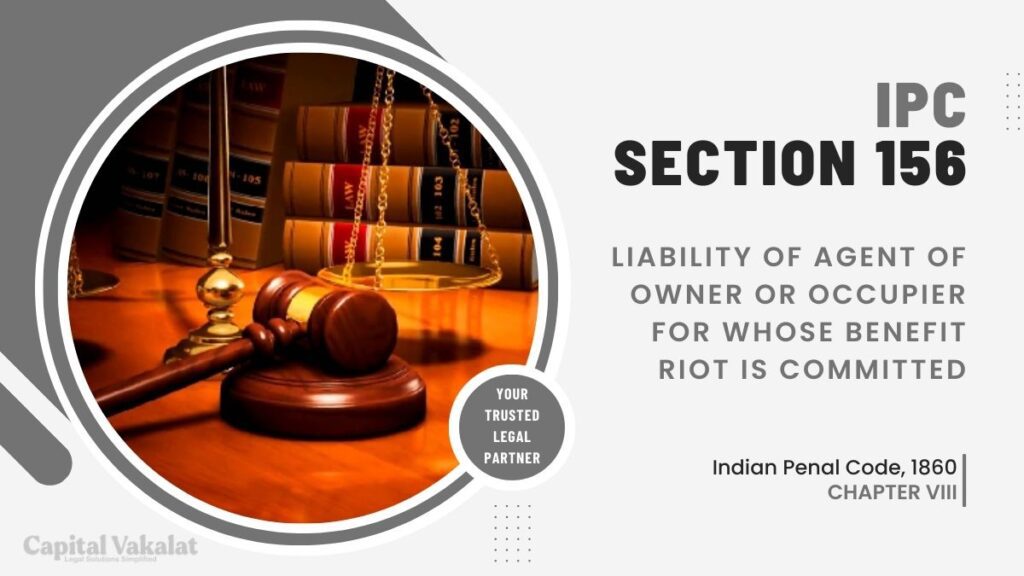Section 156 of the Indian Penal Code (IPC) deals with the liability of an agent of the owner or occupier for whose benefit a riot is committed. It is essential to understand this section to comprehend the legal consequences and responsibilities placed on individuals who may not directly participate in a riot but have a connection to it.

Riots can cause significant harm to society, and the law aims to hold those responsible accountable for their actions. Section 156 of the IPC provides a legal framework for establishing the liability of an agent in cases where a riot occurs for the benefit of the owner or occupier of a property.
Understanding Section 156 of IPC
Definition of Riot
Before delving into the agent’s liability, it is crucial to understand the legal definition of a riot. Under Indian law, a riot occurs when a group of five or more persons engages in violence or affray. These actions disturb the public peace and potentially cause harm to others.
Who Is an Agent of the Owner or Occupier?
An agent, in the context of this law, is an individual who acts on behalf of the owner or occupier of a property. This could be someone responsible for the management, control, or operation of the property. Understanding this definition is pivotal in determining the agent’s liability.
Liability of the Agent
Principal-Agent Relationship
The principle of vicarious liability comes into play in Section 156. It holds the agent accountable for the actions of others when they act on behalf of the owner or occupier. This legal relationship places a significant burden on agents to ensure that their actions or negligence do not lead to a riot.
Agent’s Knowledge of the Riot
To establish the agent’s liability, it must be proven that they had knowledge of the riot or should have reasonably known about it. In cases where the agent fails to take action to prevent or control the riot, their liability becomes evident.
Proving the Agent’s Liability
Legal Elements
To prove an agent’s liability under Section 156, specific legal elements must be satisfied. These elements include demonstrating the connection between the agent and the owner/occupier, establishing the occurrence of a riot, and showing the agent’s knowledge or negligence.
Role of Evidence
Evidence plays a crucial role in these cases. Witness statements, documents, and other forms of evidence may be used to establish the agent’s knowledge and connection to the riot.
The Consequences
If an agent is found liable under Section 156, they may face legal consequences, including fines and imprisonment. The severity of the penalties depends on the extent of their involvement and the harm caused by the riot.
Defenses Available to the Agent
Agents have certain defenses available to them, such as proving that they had no knowledge of the riot or that they took reasonable measures to prevent or control it. These defenses play a critical role in determining the outcome of such cases.
Landmark Cases
Landmark legal cases have shaped the interpretation and application of Section 156. It is essential to study these cases to understand how the law has evolved over time.
Impact on Society
The provisions of Section 156 have a significant impact on society. They deter agents from allowing riots to occur and hold them accountable for their actions. This, in turn, contributes to maintaining public order.
Criticisms and Reforms
While Section 156 serves an essential purpose, it has faced criticism for being overly broad and potentially leading to unjust outcomes. Some legal experts have called for reforms to make the law more precise and just.
Conclusion
In conclusion, Section 156 of the IPC addresses the liability of agents in cases where riots are committed for the benefit of property owners or occupiers. The law seeks to ensure that those who are indirectly involved in riots are held accountable for their actions. It is a vital legal tool in maintaining public order and preventing social unrest.
Frequently Asked Questions
Can an agent be held liable for a riot if they had no knowledge of it?
Yes, an agent can be held liable under Section 156 if it can be proven that they should have reasonably known about the riot and failed to take appropriate action to prevent or control it.
What are the possible consequences for an agent found liable under Section 156?
Agents found liable under Section 156 may face legal consequences, including fines and imprisonment, depending on the extent of their involvement and the harm caused by the riot.
Are there any defenses available to agents in cases of riot liability?
Yes, agents have certain defenses available to them, such as proving that they had no knowledge of the riot or demonstrating that they took reasonable measures to prevent or control it.
How have landmark cases influenced the interpretation of Section 156 in Indian law?
Landmark cases have played a significant role in shaping the interpretation and application of Section 156, setting legal precedents and influencing how the law is enforced and understood in the Indian legal system.